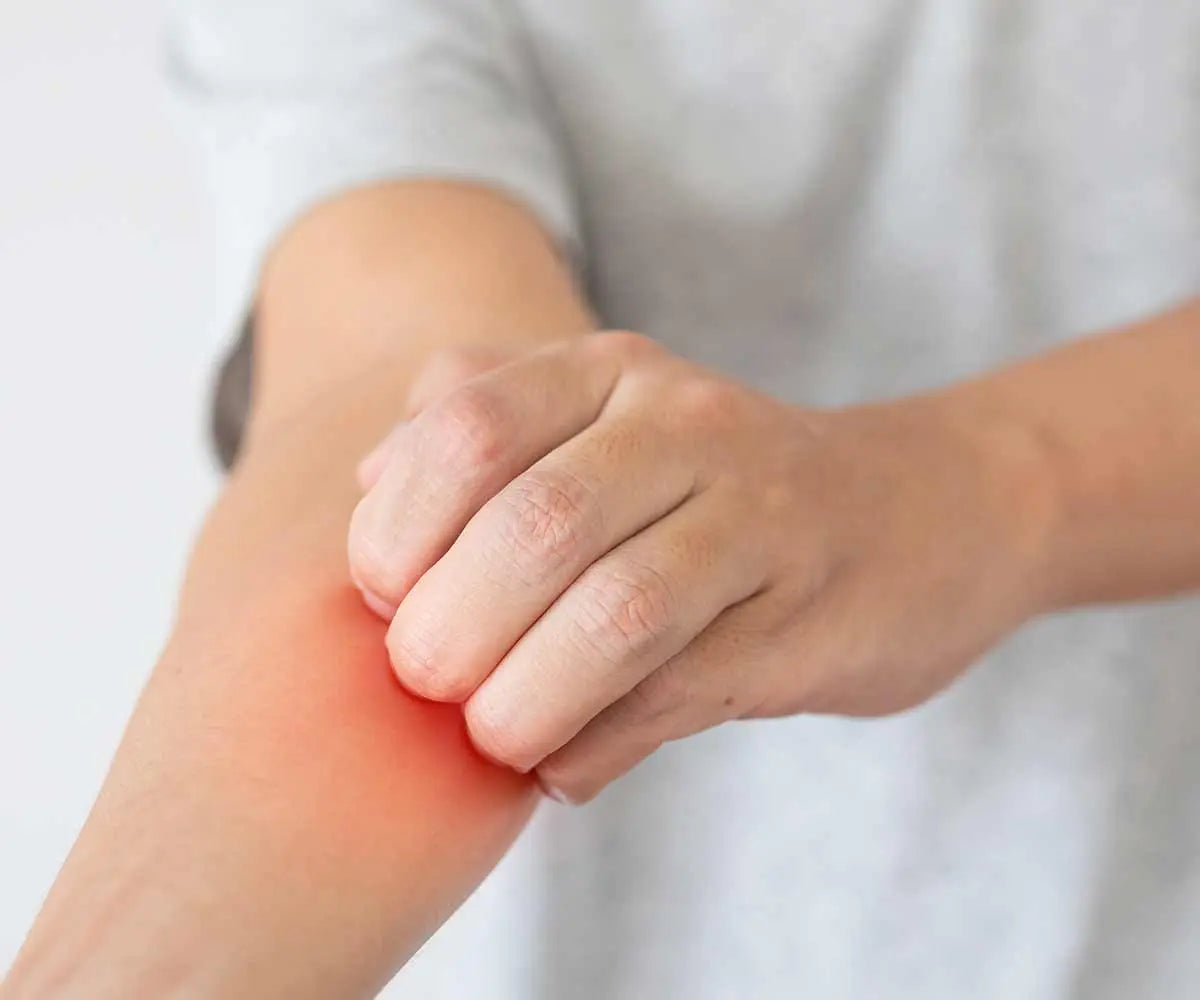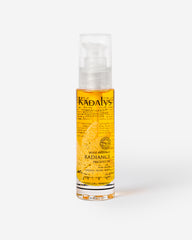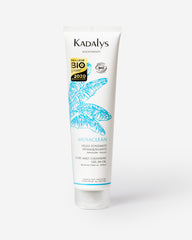
Psoriasis: definition, causes and symptoms
Psoriasis is one of the diseases that causes inflammation of the skin. It results in rather thick and red patches that flake off (come off in small shreds). This inflammatory skin disease is not contagious and affects between 2 and 4% of the population in France. Psoriasis has different causes and can affect more or less anyone. We still note that 40% of people with this skin disease have a history of psoriasis in their family. Very painful and uncomfortable, this peculiarity of skin can become very disabling if it is not treated quickly.
What is psoriasis?
Psoriasis is a chronic skin disease, just like eczema is. It is punctuated by phases of "crisis" with flare-ups of red, inflamed patches that tighten, itch and make the skin very uncomfortable. The cause of psoriasis is not known and can come from different factors:
genetic factors, about 40% of people who suffer from it have cases in their family,
environmental factors,
taking certain medications,
skin irritations (sunburn, burns, stings, etc.),
stress, lifestyle,
too rapid renewal of cells which eventually build up on the skin and form scabs.
Psoriasis patches can be thicker or thinner and more or less painful. The gaze of others in the face of this skin disease is also a pain in its own right for those affected. Rather unsightly skin, sufferers can lock themselves in and be ashamed of their appearance, it is a double suffering.
The plaques often settle on the elbows, knees and scalp. For the most serious cases, they are found all over the body. As with eczema, there are different types and psoriasis flare-ups can last between 3 and 4 months.
Who is affected by psoriasis?
The variety of triggers can cause anyone to be affected by psoriasis. Different studies do not all agree on the best times for the first outbreaks. For some, babies can already be prone to this skin disease from birth. For others it does not appear until around adolescence. For still others, it occurs when the skin becomes more mature, around age 30 or later between age 50 and 60.
One thing is for sure, people with a family history of psoriasis are more likely to have it. It is estimated that if one of the two parents is affected, their child has about a 10% chance of having it too.
It is also noted that people who are obese have a high risk of having it, such as those who have diabetes.
Other studies show that people with HIV are also more likely to have it.
In all cases, more than half of the first signs of illness appear before the age of 40.
What are the symptoms and causes of flare-ups?
The causes of relapses are quite broad and specific to everyone. They range from a family history, to taking medications containing lithium, to insect bites, states of stress or excessive consumption of alcohol or tobacco.
In some people, psoriasis is caused by too rapid cell turnover. In general, cells are renewed every 28 to 30 days but in people affected by psoriasis, they are renewed between 3 and 6 days ... The cells, too numerous, end up accumulating on the skin and creating a pile of crusts. It can also happen after an injury if the immune system is disrupted. Many white blood cells will then accumulate on the skin.
As for the symptoms, they are specific to the different forms of psoriasis.
Plaque psoriasis, the most common form also called “psoriasis vulgaris”, appears as red, thick patches covered with white skin. They are found on the scalp, elbows, knees and lower back. These red patches cause the appearance of itching.
Guttate psoriasis affects children and adolescents more. It appears as several small, dry red patches on the torso.
Pustular psoriasis is distinguished by the many pustules present on the red patches. It is mainly found on the palms of the hands and on the soles of the feet. It is a very disabling form of severe psoriasis.
Erythrodermic psoriasis is a serious form that is often accompanied by fever and chills. The plaques are very irritated and strewn with pustules. Treatment must be quickly put in place to relieve those affected and avoid the risk of spread.
Apart from all the existing forms, we also notice that depending on where it comes out ent the outbreaks, the treatments to be provided are not the same.
There are several favorable areas:
psoriasis of the face, in the area of the hairline, the sides of the nose and the bitterness (fine lines near the mouth)
reverse psoriasis (or fold psoriasis), in the skin folds (armpits, ear canals, under the breast, etc.)
psoriasis of the feet and hands, which is very painful
scalp psoriasis
psoriatic arthritis, a reaction of the immune system that turns into psoriasis and is found in the joints, tendons and ligaments. The latter couples with severe joint pain.
The best way to diagnose this chronic disease is to go to a doctor. Ditto for finding local treatments that work and that relieve the most severe forms as well as the mild ones.
Can we prevent psoriasis?
It is possible to reduce the frequency of flare-ups with a few simple gestures.
An anti-inflammatory diet would be favorable to space the attacks. For this, we adopt a gluten-free diet if we are allergic. You can also increase your intake of omega 3 (vegetable oil: rapeseed, walnuts, hemp, etc.) and selenium (nuts, thin, turkey offal, etc.). We make sure to avoid bad fats, drink water and exercise!
To prevent flare-ups, you can also avoid exposure to the sun and always think about protecting your skin.
We control our alcohol consumption and cut back on cigarettes. These two factors have been clearly highlighted in several studies.
You learn to pay as much attention to your physical state as you do to your mental state. And yes, stress or discomfort can result in rashes!
Finally, we take care of our skin with the most natural products possible. Whether during flare-ups or off, your skin is sensitive and needs softness. To offer him natural cosmetics without irritating ingredients, which could create even more violent itching, we turn to organic or raw products (vegetable oils or banana butters in particular). Indeed, the banana has soothing and healing properties. Simply rubbing a banana peel for 10 minutes twice a day is an effective grandma's remedy for naturally healing and preventing rashes and reducing itching.
banana skin psoriasis
For even more efficiency, the ideal is to combine the use of Precious Radiance Oil morning and evening, massaging the affected area to promote healing of plaques.
Also know that if you are affected by this chronic skin disease, you can perform spa treatments. There are several spa centers for psoriasis and you can benefit from treatment. Check with your doctor or health insurance fund.
What parts of the body can you get psoriasis?
Although there are some more conducive areas than others, psoriasis can appear all over the body. A person affected by this disease may see changes in symptoms, locations and types of psoriasis over the course of their life.
The most common places are the elbows, knees and lower back. We also see a lot of plaques in the areas of skin folds.
If your infant is prone to this skin disease, carefully monitor the progress at the level of his seat. Maceration of the diaper and urine do not mix well with red patches, especially if they have lesions. To avoid infection, change his diaper regularly and if possible, leave him without a diaper!
Psoriasis can also be located on the skull, on the hands and feet, on the torso and on the legs. There is even a form of psoriasis for the nails! This is nail psoriasis and is often confused with nail fungus. It is a very painful and disabling form which can prevent some people from working because of too much pain in the nails (hands and feet).
Beyond being aesthetically restrictive, psoriasis is a very painful and sometimes disabling skin disease. If you have any doubts about a sudden onset of plaque, see your doctor.
To learn more about the treatments and natural remedies for psoriasis, check out our article here!









